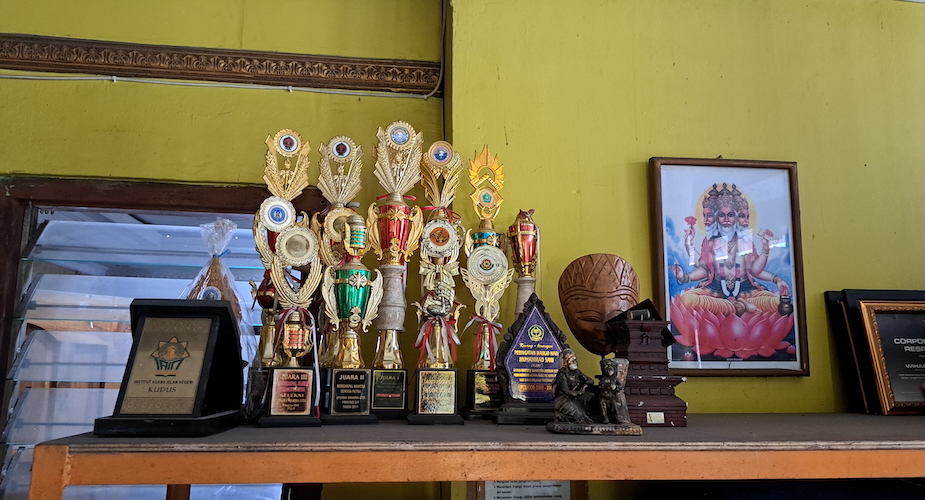A sampling of performances in Java
Julie Janson
My travels in Java coincided with the writing of my own new play The crocodile hotel, about a teacher's experiences in the Northern Territory, the Yolgnu (Aboriginal people in Arnhemland), and their relationship to Indonesia. I saw many Indonesian plays and was seduced by the vibrant energy of artists who were enjoying the creative freedom of Indonesia's reformasi era.
Yudi Ahmad Tajudin is the artistic director of Teater Garasi in Yogyakarta; Kusworo Bayu Aji is its executive director. The company creates two new performances a year and often tours to Jakarta and Surabaya.
At Utan Kayu theatre in Jakarta, I lined up with the young crowd eager to see Garasi's latest production, Percakapan di ruang kosong (Conversation in an empty room), a collaboration between the performers and the writer/ director Gunawan Maryanto. We crowded into the theatre space and took a place on the concrete floor, crouching in the darkness in anticipation. Three ash-covered actors, looking like they were set in concrete industrial cylinders, stared at us in the darkness. The audience was given medical masks, and the floor was covered in ash, perhaps a reference to the World Trade Centre disaster site. The actors recited the poem about a man taking a second wife. A beautiful woman entered, sheltering from rain under a banana leaf. She edged through the ash in a storm to the music of Sundanese drums and an electronic soundscape. She encountered a dog-man and eventually she too became a dog. Then the 'other woman' entered, creating a rich physical distortion between ugliness and delicate emotion.
Much of the work is non-verbal, but Garasi is intoxicated by Javanese traditional music and the influence of the Jathilan performance, which has a ritual basis and is performed in the open streets. They take their inspiration from Jalan Malioboro, Yogyakarta's main thoroughfare, which throbs day and night with music, and where it is possible to see seventy-year-old buskers playing the zither and singing to Dutch tourists.
In Yogyakarta, I met an old friend from Sydney, the musician Sawung Jabo. He was workshopping an innovative movement performance with street people, the desperate and creative young. He spoke about the inter-gang fights in Jakarta, with homemade bows and arrows. He hoped that the theatre and music would give them a means of expressing their feelings about current events. When I returned some months later, Jabo invited me to a rehearsal of Diantara langit dan bumi kita bergerak (We move between earth and sky) by the group Teater Oyot Suket (Grass Roots). The setting was dramatic, an earth floor outside an old house set amongst rice paddies and surrounded by flaming torches.
Aceh
Another friend, the playwright and actress, Ratna Sarumpaet, told me that her group was performing at the Bandung Performing Arts School theatre and said that I had to come. Her new play Alia, luka serambi Mekah (Alia, the wound of the verandah of Mecca) is about the war in Aceh. As in all of Ratna's plays, it concerns a woman fighting for justice. There were 32 actors so the performance had a strong ensemble character. The use of traditional Acehnese dance created a strong sense of village community. Ratna wrote about her play: Alia becomes number one enemy of the authorities ... breaking through the trap of traditional convictions for women, she becomes a person of vision and carries out the teachings of her religion (Islam) with the perspective of justice, the rights of men and women, including the rights of the dead.
When Ratna arrived in Bandung on 16th August she was interviewed on television. Immediately after the broadcast, the police came to the STSI university campus to see her. They asked her why she had not obtained permission for the performance, and she replied that it was art and as it was in a college it was no concern of theirs. The police left. I was struck by this woman's bravery, remembering that she had begun the play while in jail for three months during the days leading up to the overthrow of Suharto. In political terms, her plays are powerful documents that she takes around Indonesia, Europe and the US to educate people about human rights issues in Indonesia. In theatre terms, the plays are didactic and are prone to long impassioned declamatory speeches. Nevertheless they display a courage that is unmatched anywhere.
Overall, the modern and traditional theatre I witnessed in Java during 2001 is vital and dynamic, and it is time it was showcased in international arts festivals. If more Indonesian corporate sponsors would support these groups then the task of touring overseas would be less daunting. Indonesian theatre arts are unique, and the world awaits them.
Playwright Julie Janson (juliejanson@bigpond.com) was the Asialink Literature Resident in Indonesia 2001. Her travels were supported by the Australia Indonesia Institute and the Australia Council for the Arts.











